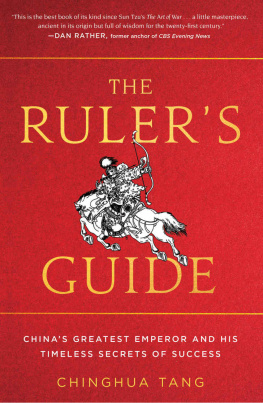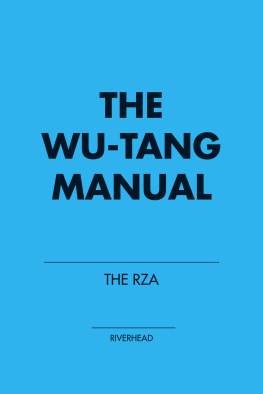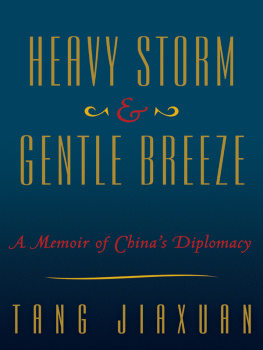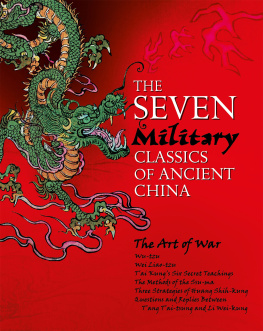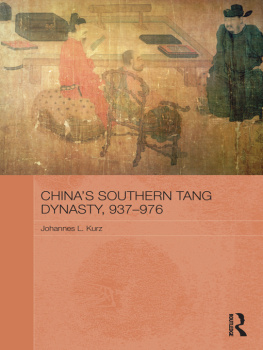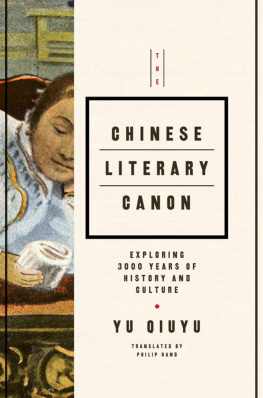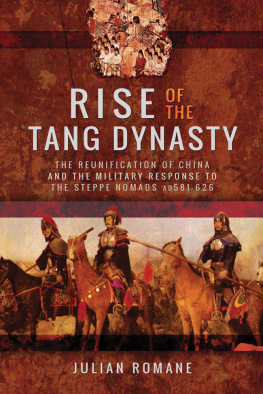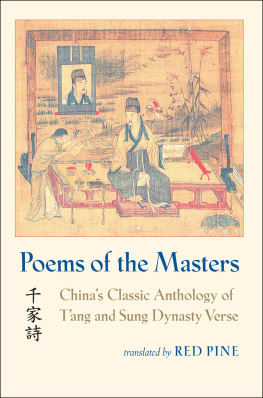Thank you for downloading this Scribner eBook.
Join our mailing list and get updates on new releases, deals, bonus content and other great books from Scribner and Simon & Schuster.
C LICK H ERE T O S IGN U P
or visit us online to sign up at
eBookNews.SimonandSchuster.com
Contents
To my beloved parents, QINGAN TANG and EILEEN H. GE , who have dedicated their lives to teaching and who have fostered in me a habit of reading.
Introduction
The Tang dynasty, one of the longest dynasties in Chinese history (618907), is hailed by historians as Chinas golden age. It didnt come about by chance. It owed much to the conscious efforts of its co-founder, Emperor Taizong.
Tang Taizong is one of historys greatest rulers, ranking with Augustus, Genghis Khan, and Napolonand even, in some cases, exceeding their accomplishments. Under Taizongs leadership, China became the worlds largest and strongest country. The emperors reign was marked by a number of savvy, innovative, and bold accomplishments, setting a high standard for all leaders who would come after. Among the feats that make Taizong extraordinary:
He assembled a team of advisers even before he assumed the throne at the age of twenty-eight.
He was a gifted administrator, presiding over all major policy and executive decision-making at his court.
He was a master military strategist, leading his armies to defeat the Turksdescendants of Attila the Hunand reopening the Silk Road.
He slew a thousand enemy fighters by his own hand.
He was remarkably versatile: an archer, hunter, horseman, poet, composer, and calligrapher.
He allowed both Christianity and Islam into China for the first time and was, indirectly, the cause of Buddhisms being planted in Tibet.
He was apparently expert at picking a wife: his empress was one of the wisest and most virtuous women in history.
He set out to build a strong, prosperous, and long-lasting empire and succeeded spectacularly.
Tang Taizong and his circle of gifted ministers held many discussions regarding how best to run the government and achieve longevity for the dynasty. Most of their conversations were recorded and later compiled in an anthology entitled The Zhenguan Executive Guide . This book has since become a classic on leadership, management, and statecraft. It has been translated into Korean, Japanese, Mongolian, Khitan, Jurchen, and Tangut. It was eagerly read by rulers of China and other Asian countriespotentates such as the Mongol conqueror Kublai Khan, the Japanese shogun Tokugawa, and the Qing emperor Qianlong. Today, Taizongs thinking is ardently studied by business executives and government leaders throughout Asia. And it is far past time that the emperors thoughts be shared with those in other parts of the world.
Wittingly or unwittingly, todays leadersregardless of what organization they headoften assume the role of ruler. Politically, the emperor is a thing of the past. However, an elected leader in many cases enjoys much the same power as an emperor within his or her domain. And, of course, business leaders and corporate managers are rulers in their world. There are rulers in virtually every field. For example:
The president of a trade union is the ruler of his organization.
The head of a philanthropy is the ruler of his institution.
The headmaster is the ruler of his school.
The teacher is the ruler of his class.
The coach is the ruler of his sports team.
The conductor is the ruler of his orchestra.
The lieutenant is the ruler of his platoon.
The priest is the ruler of his local church.
Parents are the rulers of their family.
The list goes on and on. You may be a ruler in one situation and ruled in another. You may be ruler and ruled simultaneously. You may be ruled and yet aspire to be the ruler.
Whether running a country or a commercial enterprise, whether leading a team or serving as a role model, rulers wield enormous power over the people and the resources they command. Theyre capable of exerting great influence over the society, environment, and community in which they operate. And they face many problems that are similar to those an ancient emperor would have faced.
Many books have been written on leadership and management. This one is distinctive in that it is not a one-way stream of advice but, rather, an anthology of conversations between Tang Taizong and his ministers. And because the longevity of the Tang dynasty has always been considered proof of Taizongs wisdom, the principles disclosed here have stood the test of time.
A guide to enlightened conduct for anyone in a position of authority, The Rulers Guide offers insight into many present-day management issues:
How to attain self-knowledge
How to evaluate people
How to handle the relationship between moral character and talent
How to exercise leadership
How to enhance organizational effectiveness
How to apply the art of war
How to achieve long-term success
This book brings Taizongs wisdom to a Western audience for the first timewisdom that has been studied and proven for more than a thousand years. In the pages that follow, records of the emperors conversations with his ministers are selected and organized under twelve topics. They represent the choicest part of this anthology. Following that is a profile that sketches Taizongs extraordinary life and character. In the secrets of the Tang dynastys success, youll find the secrets of all great, long-lasting enterprises.
Since my family name is, coincidentally, the same as the dynasty that Taizong helped found, I take extra pleasure in bringing his wisdom to you.
Tang Taizong (598649): Tang is the name of the dynasty and Taizong his imperial title as emperor. His personal name is Li Shimin.
The author recognizes the role of women in all spheres of modern life and asks the reader to make allowance for the use of masculine pronouns in the book.
I
CONVERSATIONS BETWEEN TANG TAIZONG AND HIS MINISTERS

1
On Being Emperor
A great person attracts great people and knows how to hold them together.
GOETHE
Taizong became emperor when he was twenty-eight years old. His life began a new phase. He applied himself diligently to learning the job.
Prompted partly by his need for help in governing the country and partly by his desire to be an effective ruler, he surrounded himself with a group of wise and dedicated advisers from different backgrounds. He had many scintillating conversations with them. He was a good listener, a humble student, an eager learner, and a keen observer. Hed proven his prowess in war. Now he set out to demonstrate his ability to run a country.
TANG TAIZONG AND HIS ADVISERS WORDS
THE RULERS HEART
Early in his reign, Taizong told his ministers: The ruler has only one heart, but it is the goal of many people. Some want to win it by bravery, some want to win it by eloquence, some by flattery, some by cunning, some by satisfying its desires. The ruler is being assaulted from all sides. Everybody tries to sell him something in order to attain power and wealth. If he drops his guard for one moment, he can make a serious mistake and get into trouble. That is why it is difficult to be a ruler.

